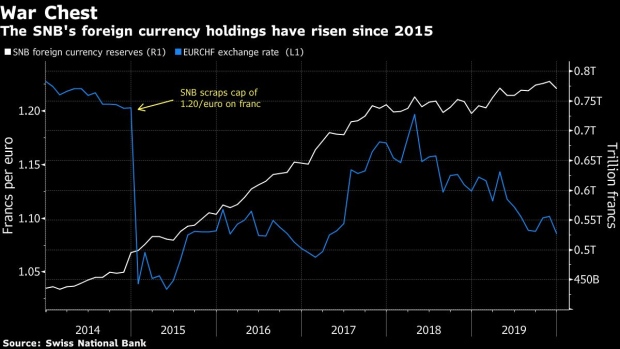Jan 14, 2020
Swiss Frankenshock Reverberates in Negative Rates Five Years On
, Bloomberg News

(Bloomberg) -- Sign up here to receive the Davos Diary, a special daily newsletter that will run from Jan. 20-24.
Swiss National Bank President Thomas Jordan is finding its hard to get the genie of unconventional monetary policy back in the bottle once it’s been let out.
Five years since he jolted markets by scrapping a cap on the franc and introducing negative interest rates, there’s little chance Jordan will be able to end the controversial policy any time soon. The currency is near the highest since 2017 versus the euro, and policy makers are adamant the measure is vital to stop a further appreciation.
The unexpected decision nicknamed the “Frankenshock” -- five years ago this week -- sent global financial markets into a tailspin. But at home Jordan was hailed for taking a brave step. The situation has since shifted. Banks blame the -0.75% rate for hurting their business, and trade unionists say it’s blowing a hole in social funding.
Jordan has attempted to calm some of the critics. The SNB plans a bigger payout to the government from its 49 billion-franc ($51 billion) annual profit, most of which was made on the huge reserves it built up fighting to the franc appreciation.
“When you try and be very critical, you conclude -- what else could they have done?” said Gianluigi Mandruzzato, an economist at EFG Asset Management Switzerland. “After five years, we’re still there with a prospect of keeping rates at rock bottom for some years.”
The dam of public opinion would probably burst if the man or woman on the street saw their bank account hit with negative rates. So far that hasn’t happened, though banks are increasingly targeting the cash holdings of the rich.
A survey by EY published on Jan. 9 found the proportion of banks keen to pass on more of the charges increased to 55% from 33% over the past year.
Amid an intense global debate about the merits of negative rates, Sweden’s central bank last month ended its experiment with the policy. For the SNB, however, economists surveyed by Bloomberg expect the deposit rate to remain at a record low for the rest of this year.
As was the case five years ago, Switzerland’s fate is tied to that of the global economy. The franc cap was scrapped in anticipation of European Central Bank quantitative easing, and the absence of any meaningful reversal in the euro area’s fortunes leaves the SNB with no room to move.
Unilateral SNB tightening could add to upward pressure on the currency, which would depress prices, and hurt exporters and the economy.
The central bank said in early 2015 that the franc would depreciate over time, but hasn’t happened. In 2018, it briefly touched 1.20 francs per euro -- the level of the cap -- but has since appreciated.
“I fault the ECB,” said Thomas Matter, chairman of Helvetische Bank and member of parliament for the Swiss People’s Party, who proposed some SNB profits be used to top up the public old-age insurance. “The SNB cannot scrap the negative rates. That would generate huge appreciation pressure.”
Read More:
- Swiss Get Creative to Dodge ‘Big Pain’ of Negative Rates
- SNB Can’t Get the Banks Off Its Back About Negative Rates
--With assistance from Harumi Ichikura and Paul Dobson.
To contact the reporter on this story: Catherine Bosley in Zurich at cbosley1@bloomberg.net
To contact the editors responsible for this story: Fergal O'Brien at fobrien@bloomberg.net, Paul Gordon
©2020 Bloomberg L.P.